Essay on Management: Top 9 Essays
Here is a compilation of essays on ‘Management’ for class 9, 10, 11 and 12. Find paragraph, long and short essays on ‘Management’ especially written for school and college students.

Essay on Management
Essay Contents:
- Essay on the Importance of Management
1. Essay on the Introduction to Management :
Management is a vital aspect of the economic life of man, which is an organised group activity. It is considered as the indispensable institution in the modern social organisation marked by scientific thought and technological innovations. One or the other form of management is essential wherever human efforts are to be undertaken collectively to satisfy wants through some productive activity, occupation or profession.
ADVERTISEMENTS:
It is management that regulates man’s productive activities through co-ordinated use of material resources. Without the leadership provided by management, “the resources of production remain resources and never become production”.
In the words of Drucker manager is the life-giving dynamic element in every business. Productive resources-men, money, materials-are entrusted to the organising skill, administrative ability and enterprising initiative of the management.
Modern business is the complex scene of forces of change constantly at work. The size, strategy, structure, motivation of modern enterprises underline the need of creative touch in successfully piloting their affairs. New products, new methods and techniques appear day-after-day to cater to the ever-changing trends of consumers’ tastes and needs. The ceaseless competitive drive to capture markets necessitates intellectual handling of refined requirements of consumers.
Management today is not just an exercise of blind authority or bossism but it implies scientific thinking, accurate planning and meticulous control to ensure quick and better results. Management has become a profession in view of the modern business becoming more sophisticated.
As ownership gets divorced from management, specialisation in business operations becomes more marked. Proprietors, shareholders and even their directors remain comparatively in the background and experts specialising in delicate and intricate matters of industrial techniques play increasingly positive and prominent role in running the business. Professional experts like engineer, scientist, market surveyor, trained executive, researcher, technician, occupy important place in running the affairs of an enterprise today.
Management now a days, therefore, consists of cadre of experts who performs a profitable job to build-up the competitive strength of the firm and they strive to “develop and expand the assets and profits” of the proprietors. According to Drucker, “Management, which is the organ of society specially charged with making resources productive, that is, with the responsibility for organised economic advance, therefore, reflects the basic spirit of the modern age.”
2. Essay on the Meaning and Definition of Management:
It is not an easy job to give the exact meaning of management.
Different writers have used the term “Management” in different senses, which will be clear from the following discussion:
Management as a Process :
In the words of George R. Terry, “Management is a distinct process consisting of planning, organising actuating and controlling performed to determine and accomplish objectives by the use of human beings and other resources.” The elements of management are: planning, organising, actuating (directing) and controlling.
These are also called the functions of management. It is through the performance of these functions that management is able to effectively utilise manpower and physical resources such as capital, machines, material, etc. to produce goods and services required by the society.
This has been shown in Fig. 1:
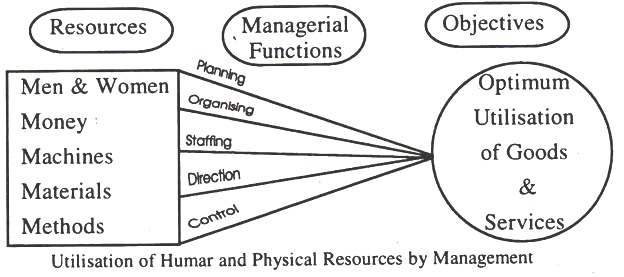
Henri Fayol has defined management as a process consisting of five functions: “To manage is to forecast and plan, to organise, to command, to coordinate and to control.”
However, modern authors do not view coordination as a separate function of management. They consider it as the essence of managing. Koontz and O’Donnell have classified the functions of management as follows: planning, organising, staffing, directing and controlling. These functions are inter-dependent and interrelated. There is no fixed sequence of their performance. They are performed more or less simultaneously.
Management is regarded a process because it involves a series of functions as shown in:
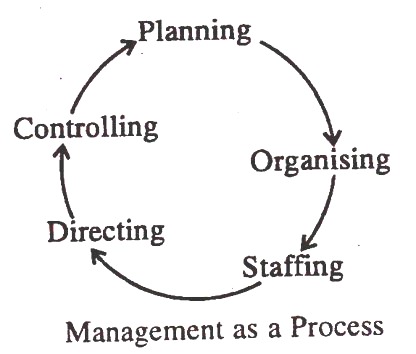
It starts with planning and ends with controlling. But it does not mean that managerial functions are followed in a specific sequence. A manager performs all the managerial functions simultaneously. Moreover, Management is a never-ending process.
There are three features of management as a process:
(i) Management is a social process as it deals with human beings.
(ii) Management is an integrating process as it organises human resources for the efficient use of other resources like capital, materials, technology, machines, etc.
(iii) Management is a continuous process. It is always involved in identifying the organisation problems and solving them.
“Management is the technique of getting things done.”
“Management is the art of getting things done.”
Marry Parker Follet defined management as “an art of getting things done through others”. This is a traditional definition of management. It emphasises that management directs the workers for getting results from them and supervises their performance. The workers are treated merely as a factor of production like materials, machines and capital.
This definition is insufficient in the modern world because of the following reasons:
(i) The above definition is incomplete because workers are treated as a mere means to organisational goals.
(ii) The management tries to manipulate the behaviour of the workers.
(iii) The needs and aspirations of the workers are not considered.
People are not mere cogs in the wheel and so they should not be treated as commodity or mere means to certain ends. Needs and aspirations of the people working in an organisation should not be overlooked. They must be satisfied so as to obtain sustained and consistent effort towards organisational objectives.
Management may be defined as a technique of getting things done through others by satisfying their needs and providing them opportunity for growth and development. According to Harold Koontz, “Management is the art of getting things done through and with people in formally organised groups. It is the art of creating environment in which people can perform as individuals and yet cooperate towards attainment of group goals.”
In order to accomplish results, management must create opportunities, and encourage growth and development of employees and provide guidance and assistance, wherever necessary. All this demands skillful application of the basic principles of the science of management. Managers must have conceptual, technical and social skills in translating the abstract organisational philosophy into concrete action.
Management is the dynamic life-giving element in every organisation. It is the activating element that gets things done through people. It provides the force necessary to transform the resources of a business organisation into desired goods and services. The primary job of management is to convert the disorganised resources of men, machines and materials into a productive organisation.
Management as a Group :
In the words of sociologists, management is a group or a class who together carry out various managerial activities.” Thus, management refers to the group of people in an enterprise who are carrying out management functions.
In other words, all individuals occupying managerial positions are collectively known as management. A manager is a person who performs the managerial functions of planning, organising, staffing, directing and controlling.
Since a manager performs the managerial functions, he is a member of the management of the organisation. Used in this sense, management includes all those who manage the affairs of an organisation. But in practice, the term ‘management’ is used to indicate the top management consisting of chairman, managing director or chief executive and Board of Directors.
Management as a Discipline :
As a discipline, management refers to the body of knowledge and a separate field of study. Management is an organised body of knowledge which can be learnt through instructions and teaching. It entails the principles, practices, techniques and skills of management which help in achieving organisational objectives. This discipline is taught widely in schools and colleges in most of the countries of the world.
Management has acquired the status of a discipline because of the following two reasons:
(i) A lot of research is being carried out by the scholars in the field of management. The results of research will be useful for future managers.
(ii) It is a specialised body of knowledge, which is studied and practised in management institutions.
Management as an Activity :
Management is an activity concerned with getting things done through people and directing the efforts of individuals towards a common objective. In the words of Harold Koontz, “Management is the art of getting things done through and with people in formally organised groups.”
Management gets results from the people by satisfying their needs, and expectations, and providing them opportunity for their personal growth. Management is a distinct activity in any organisation which is necessary for the achievement of its objectives.
According to another functional classification management activities are classified as:
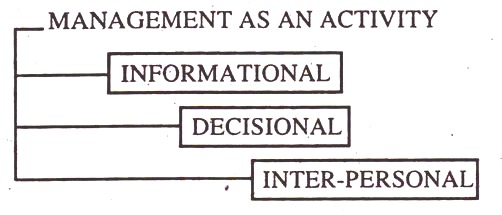
Classification of Management Activities
1. Informational Activities:
Management has to act as a communicative link between subordinates and superiors. On one hand management receives, requests explanations, statements and suggestions from their subordinates and on the other hand it also receives orders and instructions from superiors. In their informational role as managers the requisite information is passed on to both subordinates and superiors.
2. Decisional Activities:
Management being both administrative and executory has to take routine and strategic decisions regarding various operational activities so that the organisation work is executed smoothly. In their decisional role as managers, management can also be termed as innovators, resource allocators, negotiators and crisis managers.
3. Inter personal Activities:
Management being a team work and group activity requires cooperation, coordination and harmonious relationship between individuals and departments. In order to integrate and charrelise best efforts of individuals to attain predetermined objectives of the enterprise, managers in their interpersonal role act as a figure head of the enterprise, as a leader and as a liason.
Other Definitions of Management:
Various writers have given various definitions of the management.
The following are some of the important definition:
According to E.F.L. Brech, “Management is the process of planning and regulating the activities of an enterprise.”
According to Lawrence A. Appley, “Management is the development of people and not the direction of things management is personnel administration.”
According to Koontz and O’Donnell, “It is the task of manager to establish and maintain an internal environment in which people working together in groups can perform effectively and efficiently towards the attainment of group goals.”
According to Kimball and Kimball, “Management embraces all duties and functions that pertain to the initiation of an enterprise, its financing, the establishment of all major policies, the provision of all necessary equipment, the outlining of the general form of organisation under which the enterprise is to operate and the selection of the principal officers. The group of officials in primary control of an enterprise is referred to as “the management.”
According to William Spriegel, “Management is that function of an enterprise, which concerns itself with the direction and control of the various activities to attain the business objectives.”
According to Keith and Gubellini, “Management is the force that integrates men and physical plant into an effective operating unit.”
According to S. George, “Management consists of getting things done through others. Manager is one who accomplishes the objectives by directing the efforts of others.”
According to Newman, Summer, Warren, “The job of management is to make cooperative endeavour to function properly. A manager is one who gets things done by working with people and other resources in order to reach an objective.”
3. Essay on the Characteristics of Management:
The main characteristics of management are as follows:
(i) It is Goal-Oriented:
The important goal of all management activities to achieve the objectives of a business concern. The objectives of the business may be economic, social and humane.
(ii) It is a Process:
When it is used in the sense of a process, it refers to what management does. In other words, it refers to the process of managing, planning, organising, staffing, guiding, directing supervising and controlling.
(iii) It is a Group Activity:
For the success of a business, it is necessary that all human and physical resources are co-ordinated to achieve the maximum levels of productivity. We all know that the combined productivity of various resources will always be higher than the total productivity of each resources.
(iv) Management is Universal:
It is required in all types of organisations, e.g., family, club, university, government, army, business. The basic principles of management are applicable in business as well as in other organisations. However, these principles are flexible and they can be modified to suit different situations.
(v) It is an Art and Science:
It consists of both the elements of science and art. The science of management gives a body of principles or laws for guidance in the solution of specific management problems and objective evaluation of results. The management as an art consists of this use of skill and effort for producing desirable results or situations in specific cases.
(vi) It is a Factor of Production:
Not only the land, labour and capital are of effective use for the production of goods and services but the managerial skills are also used effectively for this purpose.
(vii) Management is Dynamic:
Management denotes is an ever-changing environment, It involves adoption of an organisation to changes in its environment, and modifying the environment for the benefit of the organisation. Therefore, management is a constantly growing process.
(viii) Management is a Profession:
Management is considered to be a profession as it possesses all the attributes of profession as:
(i) A systematic corpus of knowledge,
(ii) A period of apprenticeship, and
(iii) A code of conduct.
(ix) Management is an Important Organ of Society:
Management has become an important organ of society. Management of large scale undertakings influence the economic, social, moral, religious, political and institutional behaviour of the members of the society.
(x) It is a System of Authority:
In every organised group supreme authority must rest somewhere. There should be a clear line of authority from the supreme authority to every individual in the group.
4. Essay on the Nature of Management:
A study of literature of management often gives rise to a question as to whether management is a science or an art. The brief discussion which follows leads us to the conclusion that it is both a science and an art.
Management as a Science :
Science is by definition a body of knowledge gathered by experimentation and observation, artificially tested and expressed in the form of general principles.
Following are the essential features of science:-
1. Systematised Body of Knowledge:
Science being ‘systematic’ is based on cause and effect relationship. It consists of theories and principles which have the capacity to give reasons for past happenings and at the same time, can be used to predict the result of specification in future.
2. Scientific Methods being used:
Personal opinions and individual likes and dislikes don’t influence scientific principles. They are obtained through scientific investigation and reasoning. They are critically tested and can be scientifically proved at any time.
3. Principles based on Experiments:
Observation and testing the validity and truth through experimentation makes a statement, a principle.
4. Universally applicable:
Scientific princAples may be applied in all situations and at all times, exceptions though may be logically explained. These principles, under required given conditions never fail at any place or point of time.
The debate about whether or not managing is a science continues. The answer to this question depends largely on the degree to which the scientific method is used to determine managing principles and solve managing problems.
Management satisfies many of the scientific principles, for e.g.:
1. Management is a systematised body of knowledge. Its principles explaining cause and effect relationship between various variables, e.g., Principle of Unity of Command if not followed leads to inefficiency, confusion and duplication of work.
2. Management principles are evolved on the basis of observation and repeated experimentation. For instance, it is being observed through experiments that if stability in tenure of an employee is not there, his working efficiency decreases.
But, at the same time, there exists many scientific features which do not coincide with those of management.
Briefly, the method of science consists of the following steps:
1. Facts or data are collected in an objective manner.
2. These facts are classified in some way, usually on the basis of similarities or dissimilarities, in an attempt to make the data more meaningful.
3. From the classifications, hypotheses are formulated establishing cause and effect relationships between various given factors.
4. The hypotheses are then tested to determine their reliability and validity.
5. After the hypotheses are verified and if they stand the test of time, they then have interpretive or predictive value when applied to similar phenomena.
In referring to the hope of dream that a true science of management may someday be achieved. Professor Mee states, “This hope probably will be realized in another chapter in another book in another century.” Perhaps the best that can be said is that a science of management is just beginning to emerge.
It has often been stated that even when management attempts to use the method of science (from which managing principles are also derived), management is neither as precise nor as comprehensive as the natural and social sciences.
There are several reasons why this is true:
1. The rational approach and the application of the method of science are relatively new in business and industry. As a result, managing has not developed the comprehensiveness found in other disciplines that have used the scientific approach for a much longer time.
In fact, one of the more significant developments in the last seventy-five years in the field of management has been the tendency toward using the rational approach in solving management problems.
2. Relatively few managers are trained or experienced in using the method of science. Those who are trained may find it too time-consuming and, because of this as well as other limiting factors, seek other ways to reach decisions and to solve problems.
3. Precision measuring instruments and tools are not always available in management. A manager is forced to use relative measurement where absolute measurement is not possible or feasible. To evaluate the performance of a group of supervisors, for example, he may have to use a relative measuring device such as a carefully prepared rating scale. For his purposes, however, the relative measuring technique is just as useful and effective.
4. In the physical sciences, the researcher works with a single variable, holding all other factors constant. Managers can seldom do this. They almost always deal with people, the human element with all its weaknesses. The human element can never be treated as a constant; hence precision is less than in the physical sciences, though equal to that of the social sciences. Businessmen are always dealing with the unpredictable: people, governments and nature.
5. Most importantly, managerial decision-making, unlike problem solving in the sciences, stresses action rather than truth. A manager’s decisions must have practical application. Managers strive for reasonable results under uncertain conditions rather than for perfection. A method, technique, or device only has to be “good enough” to get the job done.
Management as an Art :
Art refers to the skill to put into action a systematized body of knowledge for the achievement of a given task. To get mastery in any skill it is necessary to have the thorough knowledge of the principles of doing the particular task. At the same time it is necessary to possess the tact, the care to be taken, the discretion and proper judgement in applying the principles involved.
Presence of mind, promptness to react to the given situation and correct response demanded by the prevailing condition are all essential to perform skillfully the task undertaken.
Experiences and judgement add to this skill. Management is also an art as it is necessary to apply the principles of management in planning, organising, staffing, directing and controlling the whole series of activities all through the managerial process.
Throughout the stages of the process of decision-making and execution of these decisions all the individuals occupying various positions at different levels of management need all the skills involved.
Briefly, these skills are called the planning skills, the organising skills, the staffing skills, the directing skills (how to motivate, to communicate, and to lead) and the controlling skills. Sometimes it is said that a good manager is born and not made. But it has been now established and accepted that it is through learning and training process that skilled managers are developed.
As Koontz and O’Donnell have rightly pointed out the work of managing a business or any group activity is an art. But for this the organised body of knowledge is required. It is certainly a science. Thus art and science are not exclusive terms but complementary ones.
Management as an art has the following features:
(a) Personal Skill:
Human beings apart, there are other factors which vary in their effect and role in the achievement of the managerial tasks. Managers have to apply their skill to deal with them.
(b) Practical Knowledge:
Business enterprises involve risks. Only those who have experience can deal effectively with such risks.
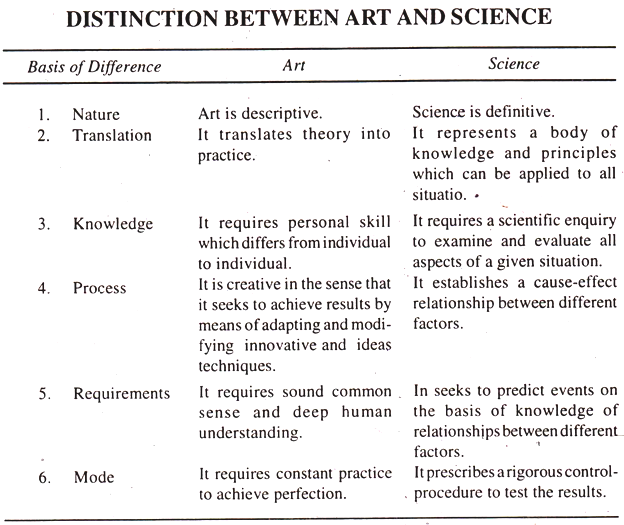
(c) Result Oriented Approach:
Management as an process aims at achieving concrete goals. It aims at utilising available resources optimally by creating a congenial atmosphere.
(d) Personal Judgement:
No doubt there are useful principles of management, but it needs individual judgement to apply them properly and at appropriate time. It means art is necessary.
(e) Continuous Practice:
The art of management is much older than the science of management which as an organised body of knowledge is hardly about ninety to hundred years old.
Management: Both Science and Art :
Management is a combination of an organised body of knowledge and skillful application of this knowledge. According to Brech, “A systematic body of knowledge underlies the competent practice of management”.
Much of this knowledge are to be found in various academic disciplines. Competent performance of various management functions necessarily needs an adequate basis of knowledge and a mature scientific approach.
Thus management is both a science and an art. It is a science because it uses certain principles. It is an art because it requires continuous practice to ensure the best possible result. Thus science and art in management are not mutually exclusive. Both of them exist together in every function of management.
Management as a Profession:
Profession is defined as a composite of intellectual and executive qualities applied to carry out successfully the specified activities for the benefit of others. It is an intellectual field. One enters into it to work without any expectation of a direct share in the profits earned out of the activities to carry out which one might be contributing his specialist knowledge or intellect.
According to George, “Profession is that which has a well-defined body of knowledge, which is learned, intellectual and organised, to which entry is restricted by examination, or education and which is primarily concerned with service to others above self-award.”
Features of Profession:
The above statement makes the following features of profession clear:
1. Existence of a body of knowledge, techniques, skills and specialised knowledge.
2. Formalised methods of acquired training and experience.
3. The establishment of a representative organisation with professionlisation as its goal.
4. The formation of an ethical code for the guidance of its conduct.
5. The charging of fees based on the nature of service extended.
In the light of what has been said above management can be said to be a profession.
The arguments in favour of this statement are given below:
1. Body of knowledge:
All over the world there is marked growth of an organised systematic body of knowledge about management as a process.
2. Formal methods of teaching:
The establishment of professional schools of management in which management as a body of knowledge can be taught is seen everywhere. India is no exception to it as is clear from the establishment of Indian Institutes of Management at Ahmedabad, Calcutta, Bangalore, Lucknow and Postgraduate Departments of Management as well as Institutes/Colleges of Management being established in different parts of the country.
3. Fee as remuneration:
The number of management consultants is increasing Even a large number of well reputed firms are establishing their consultancy agencies.
4. Existence of ethical code:
There is growing emphasis on the ethical basis of management behaviour.
5. Establishment of representative organizations:
Both at the national and international levels management associations have been formed with their membership rules, codes of conduct, etc. All India Management Association, New Delhi.
National Institute of Personnel Management, Calcutta, Institute of Marketing and Management, Institute of Chartered Accountants of India, New Delhi, Institute of Costs and Works Accountants of India, Calcutta are the well established associations in India. And many more organisations in the specialised fields/ branches of management are being organised.
Management as Profession: A Controversy :
However, there is no agreement on this point. Questions are asked: Is management a profession? Is it becoming a profession? As it is well known, a large number of business units are operating as sole traders and single entrepreneurship enterprises. By definition and in practice they are managed by proprietor-managers. So is the case with partnership firms and joint Hindu family firms.
But company form of business enterprises in India and corporate organisations in USA and other countries are even by definition the enterprises in which ownership is divorced from management. Even then question remains if all of them are managed by professional managers. As things stand, under law it is the shareholders who elect the Board of Directors from amongst themselves.
Thus the topmost group at the top level management of a company or corporate body are not professional managers. But all the big companies operating on large scale do appoint executives and managers on salary-cum-perks basis. Thus they are the professional managers.
In large companies even the Vice Presidents of marketing, finance, etc. who are on the Board of Directors are the professional managers. So are all those working at the middle level and lower level of management. In case of public undertakings management is in effect with the professional managers. Exceptions to it are Departmental Undertakings such as Railways. Posts & Telegraphs etc. which are controlled by the various departments of the Government.
But there also other than the Minister-in-charge all those looking after the management are professionals. A new trend is becoming more and more marked. Proprietary managers are becoming more interested in acquiring the latest knowledge and technique of management. They are sending their own sons, daughters and other close relatives abroad to acquire degrees and diplomas in management.
Others are joining short- term courses in management run by organisations like Administrative Staff College, Hyderabad. All India Management Association etc. Such persons are now occupying positions at the topmost layers of the managerial hierarchy.
Are these persons to be regarded as proprietary managers or professional managers ? No doubt all the features of profession are not applicable to them. But they do possess other features.
In conclusion, it may be said that all the requirements of profession are not satisfied by managers at the top. But management is, by and large, becoming professionalised, it is more so in the developed nations. But even in India large number of managerial cadres are getting professionalised.
This is applicable to both the public and private sectors. Even the case of smaller enterprises, which are run by proprietary managers, assistance of professionals such as chartered accountants, cost accountants and lawyers are being utilised to a great extent.
5. Essay on the Objectives of Management:
Objectives can be divided into three categories: Individual, Social and Organisational. Recognising the three categories and reacting appropriately to each is a challenge for all modern managers.
(I) Individual Objectives :
Individual objectives are the personal goals each organisation member would like to reach through activity within the organisation. These objectives might include high salary, personal growth and development, peer recognition, and societal recognition.
(II) Social Objectives :
Social objectives deal with the goals of an organisation toward society. Included are obligations to abide by requirements established by the community, such as those pertaining to health, safety, labour practices and price regulation.
Further, they include goals intended to further social and physical improvement of the community and to contribute to desirable civic activities.
It should be noted that most business houses in achieving their primary goals also contribute to their respective communities by creating needed economic wealth, employment and financial support to the community.
(III) Organisational Objectives:
Drucker indicates that the very survival of management may be endangered if managers emphasize only a profit objective. This single-objective emphasis encourages managers to take action that will make money today with little regard for how a profit will be made tomorrow.
In practice, managers should strive to develop and attain variety of objectives in all management areas where activity is critical to the operation and success of the system. Following are the eight key areas in which Drucker advises managers to set management objectives.
1. Market Standing:
Management should set objectives indicating where it would like to b£ in relation to its competitors.
2. Innovation:
Management should set objectives outlining its commitment to the development of new methods of operation.
3. Productivity:
Management should set objectives outlining the target levels of production.
4. Physical and Financial Resources:
Management should set objectives with regard to the use, acquisition and maintenance of capital and monetary resources.
5. Profitability:
Management should set objectives that specify the profit the company would like to generate.
6. Management Performance and Development:
Management should set objectives that specify rates and levels of managerial productivity and growth.
7. Worker Performance and Attitude:
Management should set objectives that specify rates of worker productivity as well as the attitudes workers possess.
8. Public Responsibility:
Management should set objectives that indicate the company’s responsibilities to its customers and society and the extent to which the company intends to live up to those responsibilities.
6. Essay on the Levels of Management:
More of the authors have conceived of three levels of management in any fairly-sized business undertaking.
These are as follows:
1. Top Level Management
2. Middle Level Management
3. Lower level Management
Management is considered as a Three-tier activity. The top tier centres round the determination .of objectives and policies, the middle tier concerned with implementation of policies through the assistance of lower tier of the organisation.
The various tasks in a business enterprise “become structured somewhat like a pyramid, with the highest level of management centred at its apex”.
The managerial set-up of any undertaking, therefore consists of three levels – Top Management, Middle Management and Operating Management or Lower Level Management.
The following chart illustrates Levels of Management in a company form of enterprise of fairly large size:
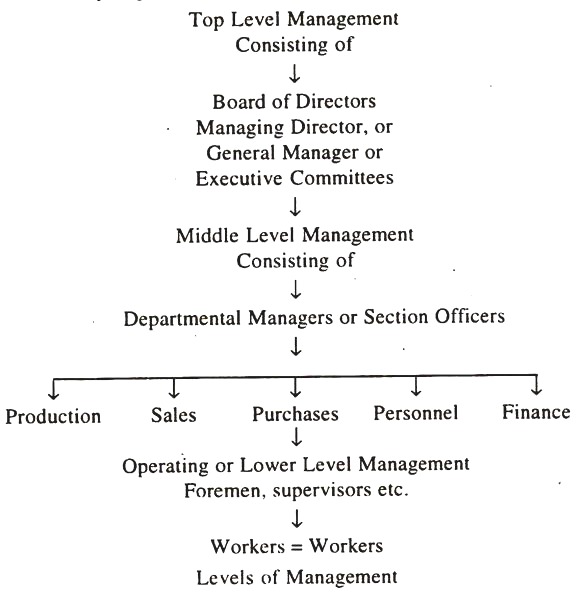
This gradation of level of management is not a watertight arrangement but represents a hierarchy of authority and responsibility designed to secure a systematic sequence of operations. Each level is blended into another through its functions and all the layers of authority constitute an integrated arrangement.
The demarcation of the levels is only to analyse the range of responsibility and span of control and it underlines the principle of specialisation in administrative executive processes.
A. Top Level Management:
Top level management is made up of Board of Directors, its Chairman, Managing Director or General Manager and other key officers responsible for smooth and systematic conduct of the affairs of the enterprise.
The top level management is a concept of functions concerning the manner in which the enterprise should be shaped.
In view of large size of modern companies, the key functions cannot be performed by a single person, and hence a compact group of elected office-bearers, experts and executives form the top management level of enterprises these days. Board of Directors is assisted by Managing Director, General Manger etc. in directing the company’s operations.
Top level management’s work is a creative process and it also involves commitments of high order of responsibility. As Allen observes “top-management work is a work which must be performed at the apex of the organisational pyramid because it cannot be carried out effectively at lower levels.”
Top management is also described “as the policy-making group responsible for the overall direction and success of all company activities.” It is a chief custodian of the property of the enterprise. It is the main mobiliser of resources in men and materials essential for the inception, maintenance, operations and expansion of the undertaking.
It is more basically a panel of planning the company’s operations and in due course shall develop into an evaluating and controlling medium for securing the maximum possible performance. It is concerned with the problems and policies of the entire enterprise.
The functions of top management include:
“Identifying key factors for the survival and growth of the company and devising basic objectives, policies and programmes for dealing with these factors: being sensitive to the inter-dependence of the numerous actions and maintaining a strategic balance in these actions; and keeping an eye on how current activities of the company will cutting with predicted changes-social, political, technological and competitive-and adopting company plans to the anticipated environment.”
Functions of the Managers at the Top Level Management :
The fundamental functions of mangers of the top management may be classified into the following categories:
(1) Determining the objectives.
(2) Framing the policies and making plans to carry out the objectives and policies.
(3) Setting up an organisational framework to conduct the operations as per plans.
(4) Assembling the resources needed to put the plans into operation.
(5) Controlling the operations through organisation.
1. Determining the Objectives :
Objectives are goals which every enterprise seeks to achieve. Most of the companies describe in detail the nature of their activities in the objects clause of their Memoranda of Association. But by and large the general objectives which top management should aim at are survival, profit, business growth, prestige or status and social acceptance.
Production of particular product of specific quality, satisfaction of customer’s needs, earning of profit by production and sales, looking out for expansion and diversification of business, building up an image or reputation of the company in the eyes or estimation of the society are the broad objectives set up by top management.
Objectives also may be specific. They relate to types of activities. Specialty in workmanship, competitive pricing, marketing method, widening the area of sales abroad, relations with the workers, customers, public, government, etc.
2. Framing of Policies :
The objectives are realised through policies framed by the management. Policies signify the decisions taken by the management on different strategic aspects of company’s operations or activities.
Production policy indicates the schedules of production to meet the market demand.
Product policy lays down the standards, specifications, size, design, colour shapes etc. of the product.
Marketing policy describes the channels of selling the product (direct sale or dealership, agency etc.), advertising and sales promotions techniques to be adopted, the sales targets to be attained etc.
Pricing policy emphasises the quality aspect of the product as well as the comparative competitive nature of the rates quoted, discounts allowed etc.
Personnel policy deals with recruitment, placement, training, remuneration, promotion, rewarding and regulating the productivity of the personnel.
Financial policy is concerned with procuring funds required for investment in fixed assets or required to be held over for working capital needs, sources of finance, e.g., borrowing, self-financing, issuing additional capital etc.
Top management has also to devise plans and schemes for precise execution of policies within a given time. Plans set out the course along which operations in different departments are to be conducted as per the criteria laid down in the respective policies.
production schedule, sales campaign, financial arrangements, personnel motivation have to be drawn as to focus and guide the activities of the company in the direction of the realisation of the basic objectives.
3. Organising:
Organisation means division of functions, allocation of duties to the personnel, fixation of range of their responsibility and the scope of their authority and coordination of the activities of the departments of the undertaking. Standardisation of administrative procedures is the main task of organising the enterprise.
Systems and procedures are the methods intended to govern the departmental activities of a company. Organisation ensures smooth flow of work from one stage to another, or from one department to another, so that the whole undertaking is enabled to achieve the targets to the benefit of the company and satisfaction of customers.
4. Assembling the Resources:
Prior to the launching of the plans, the resources of money, men and materials have to be assembled. Executives and operatives are appointed after careful selection on the basis of their merits and the nature of jobs to be handled.
Money capital has to be raised through issue of shares, debentures, etc. and arrangement for working capital has to be made through reserves, bank advance etc.
Then the physical resources-machinery, tools, furniture, buildings, water supply, power, other ancillary equipment-have to be collected as per estimated needs. The management has to find out the sources of finance for implementing the plans and programmes.
5. Controlling :
Top level management does not directly execute work. But the Chief Executive in the top management has the responsibility of exercising supervision over all the departments to make sure that the middle and lower managements are functioning as per the plans.
By controlling we mean instituting checks or comparisons of actual results with the planned targets. It implies evaluation or measurement of the work turned out in each section or department with reference to the goals envisaged in the basic plans and policies of the company.
The top level management lays down the standards of performance for the purpose of comparison of the actual results with the planned performance. Standard cost per unit, sales quotas, net profit per unit of sales are some of the reliable criteria for comparison.
Top level management finds out to what extent the performance has been upto the mark and identifies in the course the sources of strength and weakness in the different phases of organisation and operations.
Top level management has to act as coordinator and regulator of the activities of the undertaking in its different dimensions. It will call for reports, statistical data, special studies, accounting records to know the position of performance and to apply regulatory checks wherever and whenever necessary.
B. Middle Level Management:
Middle level management is concerned with the task of implementing the policies and plans chalked out by the top management. Middle management comprises departmental heads and other executive officers attached to different departments.
These departmental managers and officers are expected to take concrete steps for actual realisation of the objectives and operational results visualised in the plans finalised by the top officers of the organisation. “This group is responsible for the execution and interpretation of policies throughout the organisation and for the successful operation of assigned division or departments.”
Managers at the middle level management level exercise the usual functions of management in respect of their own departments. They have to plan the operations, issue instructions to their assistants, collect the resources required and control the work of the men under them and evaluate the results achieved by their department with reference to the plans formulated by the top management.
If the top management is endowed with the authority of policy-making, middle management is entrusted with the programming of efforts essential for implementing the basic pre-determined policies.
Functions of Managers at the Middle Level Management :
The functions of the managers at the middle level management can be broadly summarised as follows:
(i) Interpretation of policies framed by top level management.
(ii) Preparing the organisational set-up in their departments for fulfilling the objective implied in various business policies.
(iii) Finding out the suitable personnel and assigning duties and responsibilities to them for the execution of the plans of the concerned departments.
(iv) Compiling detailed instructions regarding operations and issuing them to the assistants and operatives to focus and guide their efforts accordingly.
(v) Motivating the personnel for higher productivity and rewarding them for their merit, capacity or calibre.
(vi) Cooperating with other departments so as to evolve a smoothly functioning organisation.
(vii) Collecting reports, statistical information and other records about the work turned out in respective departments and forwarding the same with their observations to the top level management.
(viii) Recommending to the top management, new or revised policies for their departments to secure better performance.
Middle level management managers are responsible for all the leading functions within each department. They provide “the guidance and the structure for a purposeful enterprise”.
The top management’s plans and ambitious expectations cannot be fruitfully realised without the key officers at the middle level management.
Managerial Structure at the Middle Level Management :
Generally the following functions at the middle level management are performed through the various departments under the departmental managers or heads.
1. Production department headed by works manager is concerned with the following functions:
(i) To collect the work orders and issue them to concerned sections.
(ii) To guide the foremen, and prescribe methods and process to be followed in execution of the work allotted.
(iii) To devise a system of inspection of factory functioning, the components, semi-finished and finished products.
(iv) Assembling the tools, equipment, plant, qualified personnel etc. to execute the production’s plan.
(v) Controlling the factory expenses.
2. Engineering Department headed by chief engineer has to perform the following functions:
(i) Production-planning, routing, scheduling.
(ii) Plant layout suited to the execution of production plans.
(iii) Designing the products, their specifications, standards, quality, workmanship etc.
(iv) Research in methodology of production for improving technical efficiency.
(v) Plant and tools maintenance and development of the full capacity of production.
(vi) Economy in production costs and resource consumption.
3. Personnel Department:
It is headed by the chief personnel officer, labour officer. He has to devise selection procedure and training schemes: he has to maintain service records of the staff and formulate methods of remuneration in conformity with the productivity and cost of living. He has to assure wholesome working conditions to the personnel and look after their social and economic security and welfare.
4. Stores Department headed by stores manager is concerned with systematic organisation of purchasing raw materials, stores articles, tools, equipment, spare parts, etc. and proper custody of the materials with the responsibility of issuing them to the requisitioning departments.
He has to sort and arrange neatly the stockpile of materials etc. and keep an up to date record of materials, stores, tools, etc. received, issued, consumed, balance held in stock, etc.
5. Office Manager is in-charge of secretarial work of correspondence, filing, indexing, use of office appliances, maintenance of records and reports pertaining to the different departments.
6. Accounts Department:
The chief Accountant is responsible for maintaining up-to-date accounts of financial transactions and recording sales, purchases, receipts and payments.
He is also required to compile periodically the Trading Account, Profit and Loss Account and Balance sheet of the firm.
He should ensure that monthly financial statements indicating the position of the firm are placed before the Board and other top management officials.
7. Costing Department:
In bigger enterprises a separate department for costing is constituted and cost accountant is appointed to administer the functions of the section.
Costing department is entrusted with the main functions of ascertaining the prime and supplementary costs and submission of cost-sheets to the top level management for appraisal.
Costing department keeps detailed records of costs of completed jobs in progress, costs of materials, labour, factory overhead costs and sales on cost. It helps the management to find out the disparity between estimated costs and actual costs and the reason thereof so that remedial measures can be adopted.
8. Sales Department:
This section is the life-blood of the enterprise because the sales are the barometer of business profits and reputations of the firm. The work of the department is to create demand for the goods for promoting maximum possible sales at quick pace in wider markets.
The vital functions of the department are as follows:
(i) Market research to find out the needs, tastes and buying habits of the consumers.
(ii) Looking out for new markets for the goods.
(iii) Organising advertisement campaigns and other sales promotion activities for creating, maintaining and expanding the demand.
(iv) Collecting orders from the customers through agents, dealers or salesmen.
(v) Executing the orders by timely despatch of goods.
(vi) Supervision of salesmen’s efforts, training and stimulation of salesmen.
(vii) Organising after-sale service and similar sales promotion efforts.
(viii) Looking after proper warehousing, packing and despatch of goods.
(ix) Attending to customers’ complaints and suggestions.
C. Lower Level Management (Operating Management) :
It is described as the lowest level in the administrative framework and actual operations are the responsibility of the rank and file constituting this level of management.
Foremen, supervisors and sub-departmental executives assisted by a number of workers, clerks etc. carry out the actual operations as per schedule. Their authority and responsibility is limited and they have to follow the lines drawn by the higher levels of management.
The plans and policies of the top level management will fail if the foremen and operatives do not fully realise the spirit of sustained work. The quality of the workmanship and quantity of output will depend on the hard labour, discipline and loyalty of the operating personnel. The foremen or supervisors are responsible for executing the work orders allotted to their respective sections.
They pass on the instructions of middle level management to the working force, procure the materials, tools etc. required for the jobs, assign specific duties to individual workmen and guide them in acting upon the instructions and handling the job on hand with ability and accuracy.
They seek to maintain precise standards of quality, prevent wastage of materials by negligent workmen, look to the safety of machines and equipment and ensure steady flow of output as per plans and programmes prescribed by the top level and middle level managements.
They are also responsible for maintaining discipline among the respective batches of workers, preserving and boosting their morale and fostering the team spirit in them.
7. Essay on Theo Haimann’s Three Notions about Management:
According to Theo Haimann management is used in three different senses:
(i) It is used as a noun. It refers to the group of managerial personnel of an enterprise.
(ii) It refers to the processes of managing, planning, organising, staffing, guiding, directing, supervising and controlling.
(iii) It is used apart from the above two—personnel and activity- but it describes the subject, the body of knowledge and the whole practice, the discipline.
I. Management is an art of getting things done through other people :
It is a process of activity consisting of some basic techniques for getting the objective of an enterprise fulfilled through the efforts of people. It is the activating element in any concern for getting things done through people. But today it is thought to be against humanity. At present: “It is the art of getting things done through and with the people informally organized groups.”
The job of management is to give active leadership that unites the productive but passive resources into a fruitful organization.
As per E. Peterson and E.G. Plowman:
“It is a technique by means of which the purposes and objectives of a particular human group are determined, clarified and effectuated.”
As per E.F.L. Breach it has been said as:
“A social process entailing responsibility for the effective of efficient planning and regulation of the operations of an enterprise, such responsibility involving a judgement and decision in determining plan and using data to control performances and progress against plans. The guidance, integration, inspiration and supervision of the personnel comprising enterprise and carrying out its operations.”
Breach signifies that it is not possible to take management in relation to things or mechanical operations of machines but only in relation to the people who are employed to operate or use such things.
As per Prof. Harold Koontz it is:
“The art of getting things done through and with people informally organized groups. It is the art of creating an environment in which people can perform as individuals and yet co-operate towards attainment of groups’ goals. It is art of removing blocks to such performance, a way of optimizing efficiency in reaching goals.”
II. Management is what management does:
The three functions of management are:
(i) Planning,
(ii) Implementing, and
(iii) Controlling.
Planning includes formation of policy and its translation into plans. Implementing includes the execution. Controlling means exercising administrative control over the plans.
In the words of Dr. James Lundy:
“Management is principally a task of planning, co-ordinating, motivating and controlling the efforts of others towards a specific objective. It involves the combining of the traditional factors of production (land, labour and capital) in an optimum manner, paying dues attention, of course, to the particular goals of the organization.”
This definition includes three major management activities of:
(1) Planning is the ascertainment of the course or objectives of a business, division or department to attain maximum profit effectiveness, the establishment of policies and continuous seeking and finding out new and better ways to do things.
(2) Implementing seeks to the doing phases, after preparation of plans, personnel attend their jobs with training of motivation not do rightly. Activities must run to the planning, supervision and direction of the subordinates and at the same time groups efforts are coordinated.
(3) Lastly, controlling seeks to evaluate acts of those who are responsible for executing the plans agreed upon. It consists of: (a) Controlling adherence to plans (b) appraising performance.
III. Management is the development of the people:
Business is not the management of things. As Appley Lowrence puts it: “The development of people and not the direction of things.” It is the selection, training supervision and development of people. These days most of the large as well as medium-sized enterprises are managed by the professional managers i.e., the managers who have got either little or no share in the ownership of the enterprise. They take management as a career.
Mcforland has noted following characteristics of a profession:
1. A body of principles, techniques, skills and specialised knowledge.
2. Formal methods of acquiring training.
3. Laying down of certain ethical codes of guidance of conduct.
4. Charging of fees according to the nature of services rendered.
And management is truly a profession in the sense that it fulfills all these conditions. Management these days is very much a systematised body of knowledge (science) and is an identifiable discipline. It has also developed a number of its tools and techniques.
In India, now there are a number of management institutes and university departments imparting formal management training. But management still, at last so in our country, does not fulfill the last time requirements of being a profession. There is, for example, still no unified ethical code of conduct for the managers as is there for the doctors and lawyers.
8. Essay on the Functions of Management:
Various authors have given various functions of management according to the time and development of the management science.
All these can be classified into the following categories:
(i) Planning
(ii) Organisation
(iii) Direction
(iv) Co-ordination
(v) Control.
These functions of management have been discussed in detail in the following paragraphs:
(i) Planning:
It is deciding in advance what is to be done, how it is to be done and when it is to be done. Planning involves projecting the future course of action for the business as a whole and also for the different sections within it. It helps in bridging the gap between the present and the future.
Planning is possible whenever there is a question of choosing and planning process is possible only when alternatives are there. In fact planning is an intellectual process. It signifies use of rational approach to the solution of problems. The important aspects of planning process are defining and establishing objectives, policies, procedures methods, rules, budgets, programmes and strategies.
(ii) Organisation:
Organisation is the structural relationship in an enterprise between the various factors i.e., men, material and management which combine to achieve the objectives set by the enterprise. In a dynamic society like ours, the organisation is not fixed. If it does not promote the objectives of the enterprise, it must be modified.
(iii) Direction:
Direction consists of command, execution, control, supervision and motivation i.e., achieving the good results. It is concerned with to use Lawrence H. Appley’s maxim “that management is essentially getting things done through the efforts of other people.”
It needs the personal touch. A good manager has to see that his orders are properly carried out and have achieved the desired results. It will need proper supervision by him and control of all the levels below him.
Moreover, his order must always create motivation among subordinates. It is only possible when his orders are of the right type and at the right moment. For it, more of initiative, sincere and tact is required than aggressiveness. A good executive must always be a good leader.
(iv) Co-Ordination:
Co-operation permeates all operating organisations and makes their entire structure more effective by harmonizing and property timing the various activities. It means synchronising the activities of all persons and functions in the enterprise and rooting out personal prestige and vested interests.
Proper co-ordination presupposes a number of conditions which can be summed up as:
(i) Fixed responsibility
(ii) Adequate authority at each executive level
(iii) Organisational structure facilitating
(iv) Co-ordination.
(v) Control:
This includes the setting of the targets or standards and comparing the actuals with standards in order to know the deviations, analysis and probing the reasons for such deviations, fixing of responsibility in terms of persons responsible for negative deviation, and correction of employees performance so that group goals, and plans devised to achieve them are accomplished.
9. Essay on the Importance of Management:
Management is absolutely essential if human efforts are to be effective to meet all round development of the society through productive activity, occupation or profession. It is essential in all organisations and at all levels of organisation in an enterprise. Without the enlightened guidance and leadership made available by management “the productive resources will remain resources and shall never become production”.
Management is a dynamic element which gives life to a business enterprise. The productive resources such as materials, men, and money are entrusted to the administrative ability, enterprising initiative and organising skill of management.
In short, management is important for the following reasons:
(i) Provides Effectiveness to Human Efforts:
It helps achieve better equipment, plants, offices, products, services, human relations. It keeps abreast of changing conditions, and it supplies foresight and imagination. Improvement and progress are its constant watch-words.
(ii) Critical Ingredient in Nation’s Growth:
An underdeveloped nation usually lacks adequate managerial know-how. National development is not solely one of transferring capital, technology, and education to citizens of an undeveloped nations. It is also supplying or developing management which provides the generation and direction of effective human energies. Management know-how utilizes the available resources effectively toward achievement of basic needs.
(iii) Brings Order to Endeavours:
By means of management, apparently isolated events or factual information or beliefs are brought together and significant relationships discerned. These relationships bear on the immediate problem, point out future hurdles to be overcome, and assist in determining a solution to the problem.
(iv) Provides Judgement and Courage:
To determine worthwhile goals, carefully select and utilize resources efficiently by means of applying planning, organising, directing and controlling require a high degree of judgement and the exercise of great courage.
From time to time, gadgets and aids are offered to replace management, but actually at best they assist and do not represent management. Serious consideration of such devices usually points out the need for more management judgement and courage to be used. Nothing takes the place of management.
(v) Helps in Achieving Group Goals:
Management touches and influences the life of nearly every human being. Management makes us aware of our potentials, shows the way toward better accomplishment, reduces obstacles, and causes us to achieve goals that we probably would not otherwise attain.
Related Articles:
- Essay on Management: Top 5 Essays
- Essay on Manpower Planning: Top 5 Essays | Process | Personnel Management
- Essay on Management: Top 7 Essays
- Essay on Strategic Management: Top 7 Essays
We use cookies
Privacy overview.
Introductory essay
Written by the educators who created Leading Wisely, a brief look at the key facts, tough questions and big ideas in their field. Begin this TED Study with a fascinating read that gives context and clarity to the material.
Understanding management means understanding people. What motivates us to engage deeply and perform powerfully at work? How do we inspire that in teams? What are the best ways to organize ourselves to exploit opportunities and solve problems? These are critical questions for all leaders who share the goal of thriving in a global, digital, fast-paced future.
There are countless ways we can approach those topics, and diverse perspectives to consider—as is evident from the thousands of management manuals, podcasts, executive seminars and more. For example, among the TED Talks included in Leading Wisely, Itay Talgam shares a lyrical metaphor on the style of the great conductors, while Clay Shirky delivers a statistical deconstruction of the power of informal networks. It's precisely this enormous scope and variety that defines the reality of modern management and which makes it so fascinating, and so vital. Modern thinking on management — from teaching and research inside universities to the way the world's most revered businesses organize themselves — has continuously evolved throughout the 20th and early 21st century. What's more, the pace of this evolution is increasing: the TED Talks in this collection cover a number of topics that didn't even exist ten years ago! This means successful managers must learn quickly, forecast trends and execute wisely.
Division of labor and beyond: Management theory is born
Industrialization shaped the work of the first management theorists in the US and Europe, where efforts to perfect new production processes gave management a practical focus and scientific method. Mining engineer Henri Fayol was one of the first to set out clear principles of management, which were formed through experiences organizing labor and machinery to extract coal in the most cost-efficient way. In the early decades of the 20th century Fayol identified six core principles of management: forecasting, planning, organizing, commanding, coordinating, and controlling. A century later, these key principles still shape our ideas about management, even though we may implement them in more sophisticated ways.
In Fayol's time, managers enacted these six principles through authority and discipline, and the regimentation of that approach created as many problems as it did advantages. For example, perfecting production techniques through the division of labor involved a systematic breaking-down of production into repetitive, individual tasks, or 'piece work'. This formed the foundation of a new mass-production economy and significantly improved the standard of living for many workers and consumers--but the work was often tedious and didn't draw upon the worker's ideas or abilities in any meaningful way.
Fayol's contemporary, Henry Ford, provides the most famous example. In his quest to mass-produce an affordable automobile, Ford identified 84 specific steps required to assemble the Model T and hired Frederick Taylor, the creator of "scientific management," to conduct time and motion studies on the factory floor. In this way, Ford reasoned, he would know exactly how long it should take his workers to complete each of the 84 steps, and he could direct the exact motions each worker should use so that the assembly proceeded with maximum efficiency. Ford also reasoned that he could reduce the time spent on each task if his workers didn't have to move from one assembly to the next. So in 1913, inspired by a grain mill conveyor belt he'd seen, Ford introduced the first moving assembly line for factory production.
Only a year later, Ford surprised everyone when he announced that he would double wages and reduce working hours at his Detroit auto plant. Wall Street investors were dismayed. Media around the world reported Ford's announcement as a philanthropic gesture, or speculated that Ford was trying to create a bigger market for his Model T by creating a new middle-class American workforce. The reality? Ford realized he could lower turnover, and the costs of recruiting and training new employees, by offering better conditions and pay.
Beyond efficiency: Valuing people
When he raised wages and shortened the work day, Ford signaled that employee satisfaction was an essential element of successful management. There was a growing appetite to understand workers in this context and, more than that, to take a sociological or even anthropological viewpoint.
Although sociologists like Emile Durkheim had begun this work in the late 19th century, the backlash against division of labor gained momentum in the 1920s and '30s, when the horrors of the First World War fueled disillusionment with wide-scale mechanization. Many felt that workers were treated as machinery measured by volume of production alone.
In contrast, Elton Mayo highlighted the importance of social ties and a sense of belonging in the workplace. In Mayo's view, managers had to acknowledge these needs and listen to their employees, in order to make workers feel valued.
Mayo's ideas originated in part from his work at the Hawthorne General Electric Plant in Chicago, where he measured the effect of lighting levels on employees at the plant. Mayo found that simply taking an interest in the activities and opinions of staff produced a motivating effect—though when his work concluded and the plant returned to business as usual, productivity dropped.
Although Mayo championed a different kind of dynamic between managers and their subordinates in order to improve conditions and increase output, workers were given no real decision making power. Nevertheless, his work advanced management theory in a significant way, and decades later we can appreciate its influence on the people-oriented, more democratic operation of many modern companies like Semco. Its CEO, TED speaker Ricardo Semler, acknowledges that "it takes a leap of faith about losing control" to reorient a company so that it truly takes care of its people and treats them as its most important asset.
The new leader
As our conception of the workforce changed – from assembly lines of replaceable robots in the era of Fayol and Ford, to individuals with diverse talents to empower (and exploit) today — so has the role of the leader. The command-and-control approach – appropriate and effective in factory-like environments – has given way to newer, more nuanced approaches to leadership that lean more heavily on inspiration and persuasion.
Modern management theorist and TED speaker Simon Sinek believes that great leaders inspire action because they think, act and communicate from 'the inside out'—beginning with and focusing primarily on their core beliefs and values. Sinek suggests that people, whether they're your employees or customers, "don't buy what you do—they buy why you do it." Hiring people who understand and embrace these core beliefs and values, Sinek claims, means they don't work just for a paycheck—they work with "blood and sweat and tears."
When people see their work in this way, the rules and incentives that leaders have leaned on in the past to manage and motivate employees may be unnecessary. In fact, as TED speakers Dan Pink and Barry Schwartz observe, they may actually do harm. Pink shows through a series of surprising experiments that traditional carrot-and-stick motivators like bonuses and pay-for-performance plans can actually decrease creative thinking and employee engagement. What's more, according to Barry Schwartz, these incentives, coupled with an over-reliance on rigid procedures, "cause people to lose morale and the activity to lose morality." Schwartz believes that moral skill, moral will, and practical wisdom are absolutely essential if organizations want to deal with complex challenges in a smart and timely way.
The importance of innovation
Up to now, we've focused on how we organize resources—and in particular, human resources—to complete tasks and meet our goals. However, this alone doesn't equip managers to launch a successful startup to compete in a fast-moving global marketplace, or to keep pace with consumers' changing values, wants and needs. Innovation and marketing are central tenets of modern management, too. How do you harness market knowledge to position yourself as distinctive and essential, and to predict what people will want and use? How can you empower team members to come up with ingenious and elegant ideas?
In an earlier era, innovation often occurred in the first stage of production, which involved creating the product blueprint; innovation may also have altered the production process in order to bring costs down. But today, organizations increasingly aspire toward innovation at all stages, in order to compete and to thrive.
To enable innovation, leaders encourage a diversity of perspectives and empower employees to contribute in unconventional, 'left-field' ways; quite often, this plays out in ways that contradict the chain of command and strict discipline which characterized early management theory. For example, some companies formalize the freedom to experiment with 'left-field' ideas in programs like Google's "20% time" and Apple's "Blue Sky" program; these provide contractual 'free time' for employees to work on their own projects, which the company may later adopt and launch. (It's worth noting that this idea goes as far back as Edison, who encouraged a young Henry Ford to play around with combustion engines in his spare time while Ford worked at Edison's light bulb manufacturing plant.)
Ideas from everywhere: The new "crowd-sourced" workforce and on-call experts
Along with enabling creativity within their teams, in recent years, forward-looking organizations have become more sophisticated in harnessing participation from the public. Through social media platforms, open-source development environments and other collaborative tools, we're increasingly able to amass ideas from around the globe, and from people traditionally considered 'consumers' rather than the 'producers' of our organizations' goods and services.
This signals a profound reversal from Henry Ford's earlier efforts to gather people under one roof around a specific task; rather, as TED speaker Clay Shirky notes, we're now able to take the question or task to the people—who may not be 'employees' as we've traditionally thought of them, and who may never meet us face-to-face in our offices. Shirky predicts that in the coming decades, loosely coordinated groups will be increasingly influential and that "one arena at a time, one institution at a time" more rigidly managed organizations will move towards different and more open methods of management.
The technology that enables crowdsourced solutions also allows leaders to tap 'expert' knowledge from around the world. We have instant access to advice from thought leaders and consultants when we're overwhelmed by the array of information and the pace of innovation in today's world—but then managers must discern what's most helpful to achieve the organization's goals, filtering out what is and isn't useful. What's more, we need to be judicious about when and how we call in the experts: in her TED Talk, Noreena Hertz argues that the constant urge to defer to experts is damaging our ability to think independently and solve our own problems. Indeed, as you make your way through the talks in this TED Study, you'll need to decide for yourself what best applies to you and your team.
All work and no play: The need for balance
Today's technology enables managers and their teams to be connected to the office 24/7, if we want to be, and organizations can draw on workforces from all over the world, at short notice. This creates amazing opportunities and thorny problems for managers. For example, how should a manager interact with employees who may be scattered on several continents, working for multiple employers on several simultaneous projects?
Technology companies developed ways to manage the 'scrum' of work and organize loose networks of employees and stakeholders, in order to coordinate a wide range of activities. Outside the tech sector, these concepts are becoming increasingly central to modern management.
Even in a more standard office environment, the challenges of prioritizing and maintaining efficiency have multiplied. The stereotypical modern open-plan office with its endless meetings and distractions can make the idea of single-minded, creative problem solving seem impossible, as Jason Fried notes in his TED Talk "Why work doesn't happen at work."
It would be difficult to explore the evolution of management without also considering the evolution of work itself. How much work do we actually want to do? And how much are we able to do, before it starts to adversely affect our lives and the organizations we work for?
Striking the right balance between our professional and personal lives is becoming easier and more difficult. For example, our ability to connect to the office 24/7 provides flexibility, but it also means managers and their teams may be tempted—or expected—to put in more hours than ever before. TED speaker Nigel Marsh suggests that workers need to set and enforce their own, individual boundaries, but he doesn't let their employers off the hook: managerial (and organizational) duty of care must come into play. This is a huge societal issue, one that's measured by national governments and critical to our individual health and happiness. But it's not solely an altruistic appeal—for organizations with an eye on productivity, employee engagement and retention, it's simply smart business.
Facebook COO and TED speaker Sheryl Sandberg is particularly interested in the challenges that many women face as they advance in their professions and become wives and mothers. Although many fathers undoubtedly feel these pressures as well, Sandberg notes that by and large it's women who are dropping out of the workforce, and this means that women are all too often conspicuously absent from the top levels of governments, corporations and other organizations. Sandberg asks managers to consider what messages they're sending to the young women in their organizations, and to create ways for all people to engage fully at work so that we benefit from their diverse and valuable perspectives.
Sandberg is candid about her own struggles with work-life balance, and her example is also interesting because it touches on so many of the other issues that we've raised in this introductory essay. Facebook is a company of 7,000 employees working across 15 countries, constantly striving to meet the needs of its more than one billion users and figuring out how to harness the power of that global network. It must continuously innovate to maintain its leadership position as social media proliferate at an amazing rate. Executives like Sandberg must nurture the talent and creative thinking of team members who fuel that innovation—or risk losing them to others who may offer more appealing opportunities.
Get started
Let's begin Leading Wisely with TED speaker Itay Talgam, who uses a musical metaphor to illuminate the evolution of management and describe different leadership styles in "Lead like the great conductors".
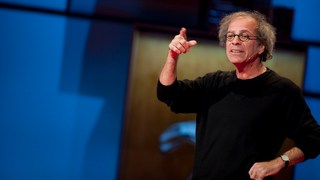
Itay Talgam
Lead like the great conductors, relevant talks.
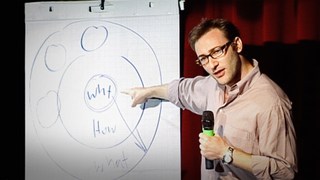
Simon Sinek
How great leaders inspire action.
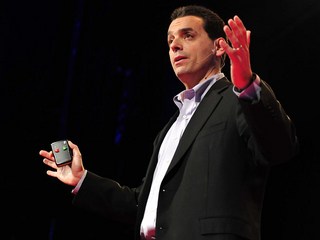
The puzzle of motivation
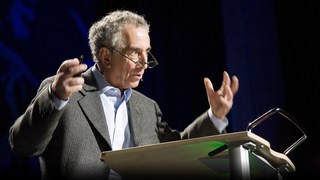
Barry Schwartz
Our loss of wisdom.

Noreena Hertz
How to use experts -- and when not to.

Clay Shirky
Institutions vs. collaboration.


Sheryl Sandberg
Why we have too few women leaders.
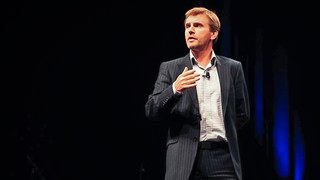
Nigel Marsh
How to make work-life balance work.

Jason Fried
Why work doesn't happen at work.

Chip Conley
Measuring what makes life worthwhile.
- EssayBasics.com
- Pay For Essay
- Write My Essay
- Homework Writing Help
- Essay Editing Service
- Thesis Writing Help
- Write My College Essay
- Do My Essay
- Term Paper Writing Service
- Coursework Writing Service
- Write My Research Paper
- Assignment Writing Help
- Essay Writing Help
- Call Now! (USA) Login Order now
- EssayBasics.com Call Now! (USA) Order now
- Writing Guides
How To Write Essay on Management?

Contrary to the common stereotypical belief that management is a skill that is needed by leaders only, everyone is in need of it. Management concepts such as organizing, coordinating, and planning are essential within the confines of an organization. It is hence fitting for all employees to equip themselves with management skills regardless of the position they holds. In theory, management skills might seem easy and management students are often at the fault for thinking that they can use books to master the different concepts involved. However, as a skill, management is developed outside the confines of a classroom and often requires numerous practical scenarios for one to comprehend its importance. Interpersonal relations, goal-setting, as well as achievement of common goals and targets, are all dependent on management. It is thus an important ingredient when talking about success and high-profit margins.
Table of Contents
Content of this article
- How to write essay on management?
- Introduction
- Body paragraphs
- Tips on introduction writing
- Tips on body paragraphs writing
- Tips on conclusion writing
- Sources for essay choice
- Finalizing essay
- Example of writing
1. How to write an essay on management?
Management essay writing is a key test that instructors use to assess their students. However, unlike other tests and essays, management essays seek to determine whether students are conversant with some of the concepts and practical skills within the management course. Management papers seek more than just how much students can remember and calls for critical thinking. They seek to test how much information students can execute or apply when faced with different management issues. Many college essays often test students’ capability to discern what the instructor is asking of them and then apply the standard methods to answer. Conversely, management papers do ask of these things but also tend to go further and seek to understand a student’s application skills as well as their ability to execute practically what they learned in theory. An essay on management can be difficult to handle if a student is used to straightforward questions and book-like answers. Memorization is important when learning but when one is handling papers on management, memorization, as well as deep comprehension of concepts, is essential.
2. Management essay structure
2.1 outline.
All essays are structured and thus need a format to act as a guide to writers. Management essays use the standard essay format, that is, they have an introduction with a thesis statement, a body that has supporting arguments, and finally, a conclusion that reiterates the writer’s stance or argument. Structuring a management essay outline is thus a simple task, and that needs to be adhered to at all times. If an essay lacks one of the above parts, it is hence termed incomplete, and a student can get penalized or be asked to redo the work.
Below is an example of a universal outline for a management essay that can be of help to students:
2.1.1 Introduction
- Introduce the topic selected or understudy.
- A brief discussion of the topic.
- The article’s main argument or thesis statement declares the writer’s stance.
- Discussion of the first argument.
- Supporting argument or statement or example.
2.1.3 Conclusion
- Reiteration of the thesis argument or statement.
- A summary of the main arguments.
3. Tips on writing
3.1 introductory paragraph.
Writing an introduction for a management essay can be a problem for some students. The above is especially true for students who are used to memorizing answers and never consider the option of gaining a deeper comprehension of the concepts being taught. The basic tips for writing a management essay begin with the introduction. How one starts the essay says a lot about their mastery of the language and the extent of the imagination. It is hence essential to have a good introduction that will entice the readers.
In the introduction, a writer is expected to provide a brief overview of the topic at hand. Regardless of the topic chosen, the writer is expected to either develop an argument and support it or provide knowledge on some concepts that are prevalent in society. Readers lose interest fast and it is thus essential to outline the paper’s main argument in the introduction. An introduction should help arouse a reader’s interest and ensure that they are fascinated enough to want to read the whole essay.
3.2 Body Paragraphs
The body paragraphs of a management essay support the writer’s argument or provide more information on the knowledge being discussed. Like other essays, management essay paragraphs often have five to six sentences while the number of paragraphs included is dependent on the task assigned. A look at many management writing guides will reveal that each paragraph often has its point or argument. Topic sentences are indeed essential here, and each needs to stand out and have supporting sentences that reinforce its main point. The use of transition words is also encouraged, but writers need to be wary of the number they include in their essays.
3.3 Concluding Paragraph
How conclude a management essay is not as hard as starting. Like all other essays, the conclusion restates the thesis statement and the main arguments. Therefore, a management essay conclusion should not be a problem, but all the above is dependent on how much research one did. While some of the parts discussed might seem easy when reading the tips, if thorough research is not done on a topic, the result will indeed be disastrous.
4. Sources for Essay Choice
Online sources where students can find good essays exist but it is essential to enquire about the reliability of the sources first. Apart from the online sources, one can also analyze the various management issues in society today and easily get an essay. Examples of some sources include:
– http://openvocabs.org/top-five-interesting-management-essay-research-paper-topics
5. Finalizing Essay
When reviewing the tips for management essay writing, two things will always emerge. They include essay revision and proofreading. Once the writer is through with their essay, it is important first to give it to close friends or family members who can help one to identify some of the mistakes and misconceptions within the paper. Essay revision is of the essence and helps writers to submit essays that are factual and free of obvious mistakes. Proofreading is also as important as revision, and it mainly helps one to avoid some obvious grammatical errors. Everyone makes mistakes, and once the essay is complete, there will certainly be one or two punctuation, sentence structure, or grammar mistakes. Submitting an essay with such mistakes will unquestionably lead to a poor grade. It is, therefore, necessary to proofread an essay before submitting it and ensure that it is free of obvious and trivial mistakes.
Bonus. Management essay example

- Free Paper Writer >
- Free Essay Examples >
- Good Essay Topics
Management Essay Example Directory with Free Sample Papers You Should Take a Look At
The idea of writing an essay on management sounds intimidating and might even cast a shadow over students' confidence in their academic skills. However, sooner or later, you would understand that learning to write persuasively and coherently is a must, and you can't get away from it. To help you build up the necessary skills and practice in writing, we've created this ever-enriching database of college paper samples that demonstrate how an A-level essay should look like. Choose the most suitable management essay sample, use it as a model and just go the path of a typical paper: decide on the topic, structure the outline, write a draft, and then polish it. In turn, our examples will help you pick up necessary language devices and writing techniques.
If that's not enough, our team of professionals will gladly assist you in dealing with your academic troubles. We will help you research or write a paper from scratch with care and meeting the highest standards. We pay close attention to preserving your academic reputation and making sure the text is 100% plagiarism-free. Place your order and enjoy the final impeccable result.
- Management Case Studies
- Management Essays
- Management Literature Reviews
- Management Reports
- Management Research Papers
- Management Term Papers
We use cookies to improve your experience with our site. Please accept before continuing or read our cookie policy here .
Wait, have you seen our prices?
We have to use cookies to be sure that our website functions properly. Click here for more information about our Cookie Policy and then tap Allow to continue your work
Top Special Offer! Check discount here
Get 13% off your first order - use TopStart13 discount code now!
- Admission Essay Writing
- Essay Writers for Hire
- Essays for Sale
- Pay for Research Paper
- Research Paper Writing
- Write My Dissertation
- Write Papers for Money
- Essay Editing
- Research Paper Editing
- Buy Assignments
- How it works
- Conclusion Generator
- Paraphrasing Tool
- Testimonials
Essays on Management
Majoring in Management, the chances are high that you will require at least one Management essay that will deal with business, financial, social, and even ethical aspects. The secret key to success here is to learn by example by taking a closer look at existing ideas to model some of your own. We are happy to make things easier for you since you can look at the most favorable essays on Management and think about structure and the key elements that must be there. Do not forget that these samples are only starting points to help you see the basics, which means that Management essays must be unique to avoid any plagiarism risks and earn the best grades!
Experts in this subject field are ready to write an original essay following your instructions to the dot!
Compensation Strategy
Various compensation strategies are being used by organizations to define its management and perceptions of employees’ p...
Virtual Team Assignment and Team Presentation
Virtual teams are fabricated by individuals who convene regularly to achieve the desired goal. In many cases, virtual te...
The Future of IBISWorld Industry
What does this industry offer to private-sector employers who want to develop the talents of their employees? IBISWorld ...
The Importance of Celebrating Milestones
When a milestone is achieved at the place of work, there is a need to celebrate as it gives the members involved morale....
The Consequences of Strategic Alliances in the Business World
When Companies join together to form an alliance, they engage in the exchange of skills and production strategies for mu...
Transformational Leadership and Change Management
Whereas companies must execute effective organizational change for better development, attention must be given to the wa...
The Importance of Human Resource Management in Start Ups
Why is no business too small to benefit from investing in Human Resource (HR) and why do start ups need them?. 2 Why Sta...
The Benefits of Transnational Strategy and Organization of Philips
With the increase in globalization and consequently the expansion of trade among countries, that has been facilitated by...
Are Women Better Change Agents Than Men?
Women are better change-agents when compared to men. Companies that are undergoing accelerated change can benefit tremen...
The Perception of Effective Female Leadership
Women continue to contribute the positive influence to political, economic, and social settings. In today’s post-modern ...
One of our experts is just a click away
- Terms and Conditions
- Money Back Guarantee
- Cookie Policy
- Privacy Policy
Customer support
- Buy Argumentative Essay
- Buy Coursework
- Buy Dissertation
- Buy Reaction Paper
- Buy Research Paper
- Buy College Essays
- Buy Narrative Essay
- Buy Thesis Paper
- Expository Essay Writing
- Law Essay Writing
- Dissertation Writing
- APA Paper Writing
- MBA Essay Writing
- Nursing Paper Writing
- Graduate Essay
- Plagiarism Free Essays
- Research Paper for Sale
- Write My Assignment
- Write My Research Paper
- Write My Thesis
- Write My College Essay
- Coursework Writing Service
- History Essay Writing Service
- Business Essay Writing Service
- Psychology Essay Writing Service
- Book Review Writing Service
- Literature Review Writing Service
- Finance Essay Writing Service
- Persuasive Essay Writing Service
- Economics Essay Writing Service
- Descriptive Essay Writing Service
- Analytical Essay Writing Service


Essay on Management
Students are often asked to write an essay on Management in their schools and colleges. And if you’re also looking for the same, we have created 100-word, 250-word, and 500-word essays on the topic.
Let’s take a look…
100 Words Essay on Management
Understanding management.
Management is a vital aspect of any organization. It involves planning, organizing, directing, and controlling resources to achieve specific goals.
Types of Management
There are several types of management such as human resource, operations, strategic, and project management. Each type focuses on different aspects of an organization.
Importance of Management
Management is important as it helps in achieving group goals, increases efficiency, creates a dynamic organization, helps achieve personal objectives, and contributes to the development of society.
In conclusion, management plays a crucial role in the smooth functioning and success of an organization.
Also check:
- Speech on Management
250 Words Essay on Management
Introduction to management.
Management is a multifaceted discipline that encompasses planning, organizing, directing, and controlling resources to achieve organizational goals. It is the backbone of any organization, ensuring its smooth functioning and success.
The Essence of Management
Management involves strategic decision-making, which requires analytical thinking, problem-solving skills, and a deep understanding of an organization’s mission and vision. Managers must be adept at coordinating resources, including human, financial, and material, to ensure efficiency and productivity.
Management can be classified into different types, such as strategic management, operations management, human resource management, and financial management. Each type focuses on specific aspects of an organization, but all are interconnected and vital for overall success.
Role of Management in Today’s World
In today’s rapidly evolving business landscape, effective management is more crucial than ever. It helps organizations adapt to changes, overcome challenges, and seize opportunities. Managers must be forward-thinking, embracing innovation and encouraging creativity to drive growth and sustainability.
In conclusion, management is a dynamic and essential discipline that plays a pivotal role in the success of any organization. It requires a blend of skills, knowledge, and adaptability, and its importance cannot be overstated in today’s competitive and ever-changing business environment.
500 Words Essay on Management
Management is a multifaceted discipline that encompasses the coordination and organization of activities in an entity to achieve defined objectives. This process involves planning, organizing, staffing, directing, and controlling organizational operations to ensure smooth, efficient, and effective functioning.
The essence of management lies in its ability to bring people together and harmonize their efforts towards a common goal. It is the backbone of any organization, providing structure and direction. Without effective management, organizations can become chaotic and directionless, leading to inefficiency and failure.
Management is not just about getting things done; it’s about getting them done right. It involves strategic thinking, problem-solving, decision-making, and leadership. Managers must be able to anticipate potential problems, make informed decisions, and guide their teams towards the achievement of organizational goals.
Functions of Management
Management functions can be broadly categorized into five areas: planning, organizing, staffing, directing, and controlling. Planning involves setting goals and determining the best way to achieve them. Organizing entails arranging resources and tasks to meet those goals. Staffing involves selecting the right people for the job and assigning them their roles. Directing is about leading, motivating, and communicating with employees. Lastly, controlling involves monitoring progress towards goal achievement and making corrections when needed.
The Evolution of Management
Management as a discipline has evolved significantly over the years. The early theories of management, such as the classical and human relations approaches, focused on efficiency and motivation respectively. However, modern management theories, such as the systems approach and contingency theory, recognize the complex and dynamic nature of organizations. They emphasize adaptability, flexibility, and the importance of considering the unique characteristics of each organization.
Management in the 21st Century
In the 21st century, management faces new challenges and opportunities. The advent of technology has revolutionized the way organizations operate, necessitating managers to adapt to these changes. The rise of globalization has made cultural competence and understanding of international business environments crucial for managers. Moreover, the growing emphasis on sustainability and corporate social responsibility has made ethical management a key concern.
In conclusion, management is an essential component of any organization. It involves a wide range of activities, from planning and organizing to directing and controlling. The role of management has evolved over time, adapting to changes in the business environment. Today’s managers must be adaptable, culturally competent, technologically savvy, and ethically aware. By mastering these skills, they can guide their organizations towards success in a rapidly changing world.
That’s it! I hope the essay helped you.
If you’re looking for more, here are essays on other interesting topics:
- Essay on Exam Stress Management
- Essay on Waste Management
- Essay on Time Management Is the Key to Success
Apart from these, you can look at all the essays by clicking here .
Happy studying!
Leave a Reply Cancel reply
Your email address will not be published. Required fields are marked *
Save my name, email, and website in this browser for the next time I comment.
Home / Essay Samples / Business / Management / Leadership and Management
Leadership and Management Essay Examples
Analysis of british airways leadership and management roles.
British Airways is United Kingdom’s largest international airline, with destination towards all over world with more than 550 routes. All over the world the airline has been internationally recognised for its high standards and they are also characterized by airline critics as well as the...
Exploring the Difference Between Management and Leadership
In the realm of organizational dynamics, two pivotal concepts, management and leadership, play distinct but interrelated roles. This essay delves into the nuanced difference between management and leadership, exploring their unique characteristics, approaches, and their collective impact on the success and growth of individuals and...
Leaders Vs. Managers: Unveiling the Distinct Roles
Leadership and management are often used interchangeably, but they represent distinct roles that shape the dynamics of organizations. This essay delves into the differences between leaders and managers, exploring their unique qualities, contributions, and impacts on teams and organizations. Leadership transcends traditional management functions by...
Leadership and Management - the Fundament of Organisational Culture
This “Difference between leadership and management” essay is constructed to explain how complex organisations work, and their need for leadership and management. In order to explain how these complex organisations work and their need for leadership and management, the theories and practices of both leadership...
Are Leaders Born Or Made
To start with, in are leaders born or made essay I will answer this question. Leadership is a skill that an individual possesses to lead an entire team and guide them for their work to achieve the goals and targets of the organization. In a...
The Fundamentals of Leadership: Strengths and Weaknesses
Leadership comes in all forms and not all leadership has a set direction. Some people can be described as born leaders and some people aspire to become the leader they read about or watched over time, the thing is, leadership can be found in everyone....
Political Issues of British Airways Company and Its Corporate Structure
British Airways is the nation's second largest and most well-known airline, based in Heathrow Airport and Gatwick Airport in London. March 1974 is recognized as the foundation of British Airways. This year, the United Kingdom's current government merged four companies: two nationalized airlines corporation: British...
Andrew Carnegie's Business Leadership Approach and Achievement
Andrew Carnegie was born in Scotland to a low-income family that later moved to the United States to search for a better life. Carnegie started working at the age of 13 in a cotton mill and later as a telegraph messenger boy. In his life,...
Analysis of Liberal Art Colleges
Are Liberal Art colleges the best option for students? For high school students getting ready for college is an important part of their life because they want to choose the right one for themselves. In the past year, many Liberal Art colleges has increased the...
Significance of Leadership in Business
Leadership is the most basic role towards the successful operation of any organization. There are many leadership styles which lead to different achievements depending on what style is used. Leadership directly impacts on the employees negatively or positively which leads to demotivation or enthusiasm respectively....
Trying to find an excellent essay sample but no results?
Don’t waste your time and get a professional writer to help!
You may also like
- Warren Buffett
- Total Quality Management Essays
- Accounting Essays
- Comparative Analysis Essays
- Outsourcing Essays
- Project Management Essays
- Customer Service Essays
- Supply Chain Management Essays
- Human Resource Management Essays
- Time Management Essays
- Business Ethics Essays
samplius.com uses cookies to offer you the best service possible.By continuing we’ll assume you board with our cookie policy .--> -->